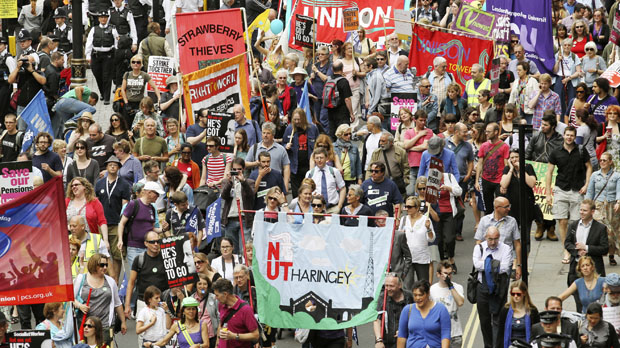Headteachers to hold first strike ballot
The union representing thousands of headteachers and their deputies is to hold its first ballot on whether to strike in November over a dispute over reductions to their pensions.
- Chapters
- descriptions off, selected
- subtitles off, selected
- captions settings, opens captions settings dialog
- captions off, selected
This is a modal window.
This is a modal window. This modal can be closed by pressing the Escape key or activating the close button.
The National Association of Head Teachers (NAHT) – which represents 28 500 headteachers and deputies – will vote from September 29 on whether to strike for the first time in the union’s 114-year history.
The decision to strike will be announced on November 9, three weeks before the TUC’s national day of action in protest at the Government’s controversial plans to increase pension contributions for millions of public sector workers.
Several unions, representing a range of public sector employees from council and health workers to teachers and school heads, are now preparing to hold ballots for industrial action ahead of the November 30 day of action..
The NAHT announcement came as talks between union leaders, Cabinet Office Minister Francis Maude and Chief Secretary to the Treasury Danny Alexander ended with the two sides still a “long way apart”, according to TUC general secretary Brendan Barber.

Cabinet talks stalled
Mr Barber said after the two-hour meeting at the Cabinet Office that unions remained committed to continuing with the long-running talks but were pressing ahead with planning for industrial action.
The two sides talked about the future funding limit that might be applied to each of the public sector pension schemes and further discussions will be held, he said.
“There has been no dramatic change and unions will be stepping up their efforts to ballot their members and planning for industrial action.
“We have put some serious proposals on the table but regrettably the ministers did not accept them and are continuing to press ahead with very damaging changes to pensions,” Mr Barber said.
A Cabinet Office spokesman said: “We are totally committed to genuine engagement with the unions. We have a lot to talk about and there are proposals on the table for discussion.
“Central discussions have been going on for several months, and the Government is committed to working with the unions to achieve necessary reforms.
“It is extremely disappointing that the TUC is calling on union members to lose a day’s pay and go on strike while serious talks are still ongoing. This is a genuine and meaningful dialogue, which includes discussions about how to implement the changes on contributions set out in the spending review.
“The Government is committed to this dialogue in order to agree a way forward. However, the unions also need to commit to genuine engagement and make constructive proposals.”
A TUC spokesman said: “We are determined to do our best to end this dispute through negotiation. But, despite many hours of talks, we have had little or no movement from ministers on the substantive issues.
“We hope that the obvious growing anger of staff across the public sector will help persuade the Government that they need to not just talk but start to seek agreement.”
‘Government not negotiating properly’, says Ed Miliband
Asked to condemn the strikes in an interview with New Statesman magazine, Labour leader Ed Miliband said: “I’m not going to get into hypotheticals about strikes that may or may not happen.
“What I’m going to do is say Government has a responsibility to properly negotiate and they’re not doing it and they’ve got to do it. The unions have to make their own judgment about what they do.
“I’ve got to make a judgment about whether industrial action is justified or whether it’s unjustified … we’re not at November 30.
“I’ll take a judgment about that if we get to that.”
Conservative Party co-chairman Baroness Warsi said: “Ed Miliband’s weakness is fast becoming his hallmark.
“He abandoned promises to weaken union influence over Labour policy.
“Now he refuses to condemn unjustified strike action, despite the reasonable pension proposals that are still open to negotiation.
“He is clearly in the pockets of the union paymasters who arranged his election and bankroll his party.”